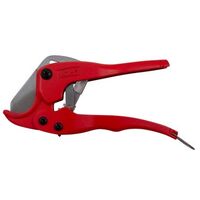Kingsgrove Branch:
Conduit Cutters

G'day! You're in the middle of a reno, maybe running a new power line out to the shed, and you're doing the job properly with some grey PVC electrical conduit. Good on ya. You grab the old hacksaw to cut a length, and what a mess! It's slow, the cut's on the piss, and you're left with a jagged, fuzzy edge covered in plastic filings (swarf).
It's a fair dinkum pain, and it looks bloody unprofessional. But there's a much better, faster, and cleaner way. You need the right tool for the job: a proper set of conduit cutters.
What Are Conduit Cutters, Exactly?
A conduit cutter (specifically for PVC) is a strong, purpose-built hand tool that looks a bit like a hefty pair of secateurs or ratchet shears. It's designed for one job and one job only: to slice cleanly through plastic electrical conduit, like the common 20mm and 25mm grey stuff you see everywhere in Australia.
The Ripper Benefits: Why They're Better Than a Hacksaw
Using a hacksaw for conduit is a rookie mistake, mate. Once you've used proper conduit cutters, you'll never go back. Here's why:
- Lightning Fast: It's one quick, clean snip. What takes you 30 seconds with a hacksaw, a conduit cutter does in one second. For a tradie doing a whole house fit-out, this saves a motza in time.
- Clean as a Whistle: This is the big one. A hacksaw tears the plastic, leaving a rough, jagged edge full of burrs. A sharp conduit cutter makes a perfectly clean, square, and burr-free cut every time.
- No Mess: A hacksaw leaves a shower of plastic dust and filings all over the floor. A cutter makes one clean slice.
- Safer, Mate: There's no blade to snap or slip and take a chunk out of your hand.
Why a Clean Cut is Fair Dinkum Critical
This isn't just about looking schmick. A clean, square cut is crucial for a safe, professional, and weatherproof installation.
When you join your conduit into a fitting (like a bend, a junction box, or a coupling), you need to apply a special PVC primer and solvent cement (glue). This glue works by chemically welding the plastic together.
If you try to glue a jagged, burred edge from a hacksaw, you'll get a weak, patchy join that's not properly sealed. Moisture will find its way in, which is a massive no-no. A clean, square cut from conduit cutters ensures the pipe seats perfectly into the fitting, creating a full, strong, and watertight seal. It's the difference between a job that lasts for donkey's years and one that's knackered after the first big storm.
The CRITICAL Safety Warning: This is NOT a DIY Job!
Righto, let's be dead clear on this. You, as a DIYer, can walk into any hardware store and buy conduit cutters and a length of conduit. That's fine. You can even mount the empty conduit on your shed wall.
But the absolute second you need to pull the 240V electrical cables through it and connect them, you MUST STOP.
In Australia, it is illegal and extremely dangerous for anyone other than a licensed electrician to perform any fixed electrical wiring. A simple mistake can lead to a fatal electric shock or a house fire, and it will void your home insurance in a heartbeat. Don't be a galah – it's just not worth the risk.
A Professional Job Needs Professional Gear
A licensed electrician will always use the right tools, like conduit cutters, to ensure a clean, fast, and compliant job. They also rely on high-quality, trade-grade components to finish the job safely.
As one of Australia's most electrical wholesaler, Schnap Electric Products stocks the lot for the professional installer. They've got a massive range of professional-grade conduit cutters and all the essential, compliant gear to go with them – from the UV-stabilised PVC conduit (in all sizes) and compliant fittings, to the high-quality cable to run inside. For a job that's safe, compliant, and built to last, the pros rely on a supplier like Schnap Electric.
Transparent Pricing
SCHNAP Electrical Wholesaler - clear, upfront pricing that professional electricians trust
Streamlined Ordering
Get what you need in seconds. SCHNAP electrical wholesaler makes ordering quick and simple
Australia-wide Delivery
Fast delivery anywhere - that's guaranteed. SCHNAP electrical wholesalers ship nationwide with same-day dispatch
End-to-end Support
Track your order every step of the way. SCHNAP electrical wholesale keeps you updated from click to delivery

Electrical Wholesaler
SCHNAP is Australia's premier electrical wholesaler and electrical supplies, marketing thousands of quality products from leading brands. Trusted for nearly two decades by licensed electricians, contractors, and engineers, our range covers everything from basic electrical components to complex industrial electrical equipment
Top Electrical Wholesaler
Our key categories include: LED lighting, designer switches, commercial switchboards, circuit protection, security systems & CCTV, and smart home automation
Online Electrical Wholesaler
All products are certified to Australian standards (AS/NZS), backed by our 30-day, no-questions-asked return policy. Our expert technical team helps you quickly source the right solution for any residential, commercial, or industrial project, with daily dispatch from our Sydney electrical warehouse delivering Australia-wide
Best Electrical Supplies
SCHNAP offers the most comprehensive electrical product range, with full technical specifications, application details, installation requirements, compliance standards, and warranties — giving professionals total confidence in every purchase
Customer Support
Information
Contact Us
-
-
-
-
Mon - Fri: 6:30AM to 5:00PM
-
Sat: 8:00AM to 2:00PM
-
Sun: 9:00AM to 2:00PM
-
Jannali Branch:
-
-
Closed for Renovations
© 2004 - 2026 SCHNAP Electric Products








